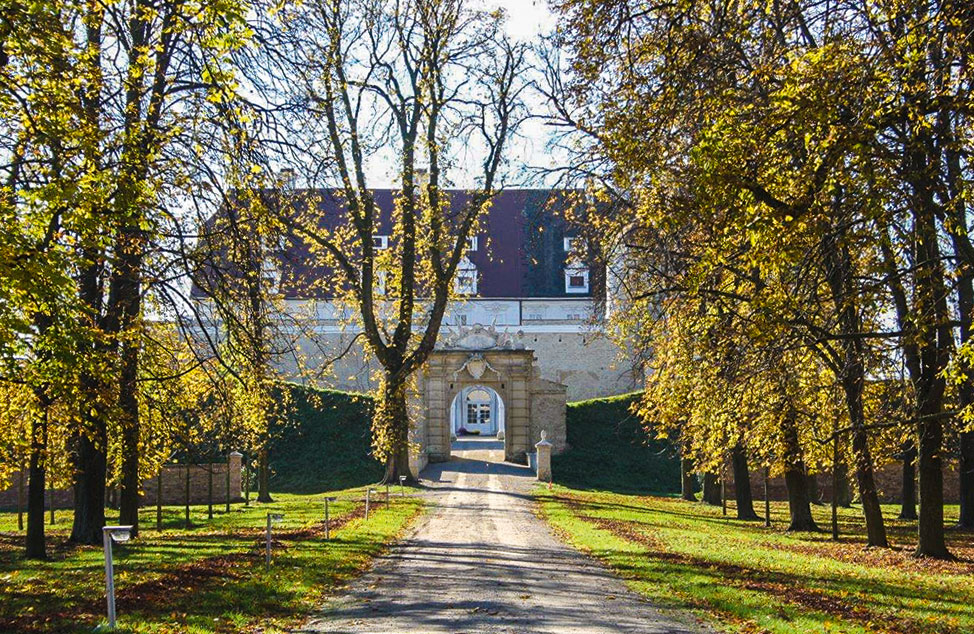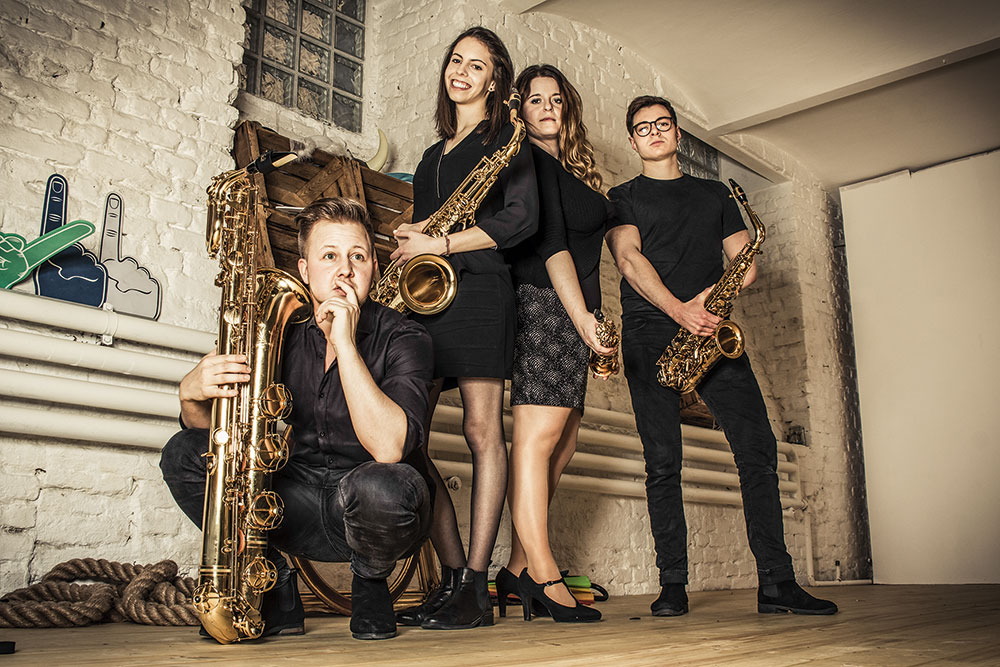A New Collaborative Project Between the mdw’s Career Center and the Department of Cultural Management and Gender Studies
Whit Weekend in 2019 will witness the first-ever Pfingstfestival Stetteldorf. This music festival will see musicians from the mdw present three chamber concerts featuring works from periods ranging from baroque to contemporary in the magnificent spaces of Schloss Stetteldorf as well as in the rustic barn that’s to be found on its grounds. A further highlight of this festival will aim to stimulate multiple senses under the heading of Bach und Bacchus, a project in which wine and music will enter into an appealing symbiosis at three special locations within the palace. Katharina Pfennigstorf, head of the mdw’s cultural management programme, Career Center head Susanne Latin, and members of the Aureum Saxophone Quartet (which will be performing) spoke with mdw Magazine about the festival.

This year will witness the inaugural edition of Pfingstfestival Stetteldorf, which is also the first “practical” project in the new curriculum for students of the mdw’s programme in Cultural Management. How did this collaborative project come about?
Katharina Pfennigstorf (KP): The Vice Rector for Academic Affairs, Art, and Young Artists’ Promotion, Barbara Gisler-Haase, had been looking to more strongly involve the IKM’s cultural management students in the activities of young artists for quite some time. Over the course of the talks that took place as a result, it became clear that it should take place as collaboration among peers in which the cultural management and instrumental studies students would develop something as part of which all participants could gain experience in areas new to them. The big challenge here was to arrive at a form of cooperation that would be feasible for everyone in terms of both content and time investment while also being compatible with the cultural management program’s extra-occupational character. There had already been some initial experience cooperating with Schloss Stetteldorf, with both sides being interested in intensifying this work together. So eventually, all of these thoughts ended up giving birth to the idea of a festival in and around the palace.
What responsibilities are being assumed by cultural management students in terms of the festival’s organisation?
KP: A great many! They’re doing the scheduling, compiling the budget, and procuring additional funds, as well as working on getting the local community involved, advertising the festival, and selling tickets—and they’ll also be managing things onsite. They’ll do all this, of course, in close coordination with course instructor Andreas Vierziger (who’s serving as project head), the Career Center, and the Stradiots—who own Schloss Stetteldorf and, together with their staff, already have some experience in holding events. The cultural management students weren’t involved in selecting the musicians, but they did work together with them to compile the programme and develop suitable concert formats.
Why was a practical project added to the curriculum, and how will it benefit the students?
KP: Although the lion’s share of the IKM’s cultural management students work for a living, they’ve repeatedly expressed their desire for our programme to have a practical component. In light of the limited time resources of those participants who hold down regular jobs, however, it was important to us when we added practical projects to the curriculum in 2017 to allow participants a choice: they could either do work on their own projects, join projects being pursued by other programme participants, or work on the projects that we offer—some of which arise in cooperation with cultural institutions. Among other things, these practical projects offer students the opportunity to reflect upon their own doings, to benefit from exchange within the group and with the course instructor, to try out working in an area that’s new to them, and to build up close contact with cultural institutions while also getting a look at how things run behind the scenes there.
How is the Career Center’s collaboration with the IKM on Pfingstfestival Stetteldorf shaping up, and how does each side benefit?
Susanne Latin (SL): This practical project is designed to run for a total of three semesters. Its first semester has IKM students deal with topics including new concert formats, the analysis of local conditions, artists’ positioning, branding, and marketing. It’s during the second semester that the musicians get involved, and teams for the project’s respective areas of work are then formed by students from both areas. This intermixing makes for a strong dynamic: the musicians get to know the cultural managers’ work in terms of their concrete responsibilities, and the IKM students profit from this project’s actual realisation together with the performance students. All of these preparations then come together in the third semester, when the festival actually takes place. One major thing we’re trying to do here is to enhance these two groups’ understanding of the areas in which their respective counterparts work. It’s about mutual esteem, from which both sides ultimately benefit.
What opportunities does Pfingstfestival Stetteldorf open up as a platform for the students being promoted by the Career Center?
SL: In light of how the labour market situation for artists is changing, teaching them stronger self-management skills is becoming more and more important. And this collaboration offers the students enormous opportunities: they acquire comprehensive familiarity with how artistic projects get carried out, from their inception to the overall planning to actual conduct. In doing so, they become more professional in dealing with organisers while also working on the competencies they need in order to carry out their own artistic projects. All of which serves to improve these young artists’ career chances in a crucial way. And we’re all the more happy, of course, to be able to do it in a beautiful setting like Schloss Stetteldorf.
How were the participating musicians and ensembles chosen?
SL: An open call for applications to participate in the Pfingstfestival was addressed to all instrumental studies students as well as to everyone who’d graduated from the instrumental studies programme within the preceding five years. The selection from among those who responded was then made by a jury that included representatives of the Career Center and the IKM as well as the Vice Rector for Academic Affairs, Art and Young Artists’ Promotion Barbara Gisler-Haase.

What sparked your interest in performing at the Pfingstfestival?
Aureum Saxophon Quartett (ASQ): The idea of joining together to build up and shape a new festival appealed to us a lot from the very beginning, particularly in light of the special place where it’s being held. And as a quartet, we’re generally very interested in working on new projects and ideas of all kinds.
You’re playing a matinée concert in the barn on the palace grounds on the festival’s second day. What criteria did you bring to bear in selecting pieces for your programme?
ASQ: We conceived our programme so as to provide the audience with a broad introduction to the diverse sounds of the saxophone. And the programme’s title—Classical: Down-to-Earth—refers to the interface between folk music and classical music. This meeting of two supposedly contradictory notions is also reflected in our unusual concert venue: the rustic barn on the grounds of the elegant and charming Schloss Stetteldorf.
How have you benefited so far from this project and from collaborating with the students from the IKM?
ASQ: Being able to observe the work done by the management team in such detail opened up new perspectives and possibilities for us. As an ambitious young ensemble, we know a lot of these processes from our own experience. But the professionalism in that’s in play here—which, thanks to the IKM, is a given—provides us with still deeper and better insights as well as new ideas.
Related links:
Event tip
Pfingstfestival Stetteldorf
9 and 10 June 2019
Schloss Stetteldorf
Schlossstraße 1
3463 Stetteldorf am Wagram
For tickets and information go to www.pfingstfestivalstetteldorf.at

